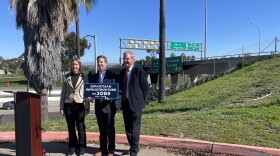The Supreme Court is expected to rule this week on a case that may shake up race-conscious admissions in higher education. The justices could change the shape of affirmative action or even strike it down altogether.
California is one of eight states that have already scrapped affirmative action. That means state schools can no longer consider the race of its applicants. At the University of California, Los Angeles, the change has been messy, ambiguous -- and sometimes a little ugly.
After the state passed the ban in 1996, the percentages of black and Latino students at UCLA quickly began to fall. Things came to a head in 2006. That year, in a freshman class of nearly 5,000 students, just 96 were African-American.
Corey Matthews -- one of the "Infamous 96," as those students came to be known -- said it shaped his experience at the huge school. Even in lecture halls filled with hundreds of students, he says, he was often the only African-American student.
UCLA realized there was a problem, so it decided to start something called "holistic review," taking into consideration a wide range of factors in its admissions decisions -- from GPA, to family income, to whether an applicant was the first in the family to go to college. Race was not one of the factors, but indeed, the percentages of black and Latino students began to rebound.
Then things got complicated again.
Last year, a UCLA professor released a study claiming the school was letting some black and Latino students in at higher rates than white or Asian students who should have ranked just the same under the new holistic review.
In other words, the study said, UCLA was breaking California law and instituting affirmative action.
UCLA's newspaper, Daily Bruin, published a story on the study and ran an opinion piece suggesting the school re-evaluate its admissions policy.
In response, student groups led rallies to protest the study and the Daily Bruin. They said a reference in an op-ed to an "undue percentage" of minority students was offensive and minimized those students' hard work.
"The reaction was not pretty," James Barragan, the paper's editor in chief, tells NPR's Rachel Martin.
"I got a long email calling me an embarrassment to my race because I wasn't supporting the cause," he says.
Barragan, whose parents are Mexican, says he agrees that the goal should be to get more racial diversity on campus -- but only if it is done fairly.
"We feared at the paper, once we saw the study, that this diversity was coming at a cost of other students who were also qualified to be there and maybe weren't getting the same opportunity," he said.
UCLA says it stands by its admissions policy and points to a review by faculty that refutes the study's findings. A school spokesperson told NPR that UCLA's holistic review is not only legal, but also a fairer and more equitable way to evaluate applicants in an increasingly diverse state.
If the Supreme Court finds affirmative action unconstitutional this week, a lot of schools could wind up facing the same dilemma UCLA has dealt with for nearly two decades.
Copyright 2013 NPR. To see more, visit www.npr.org.






